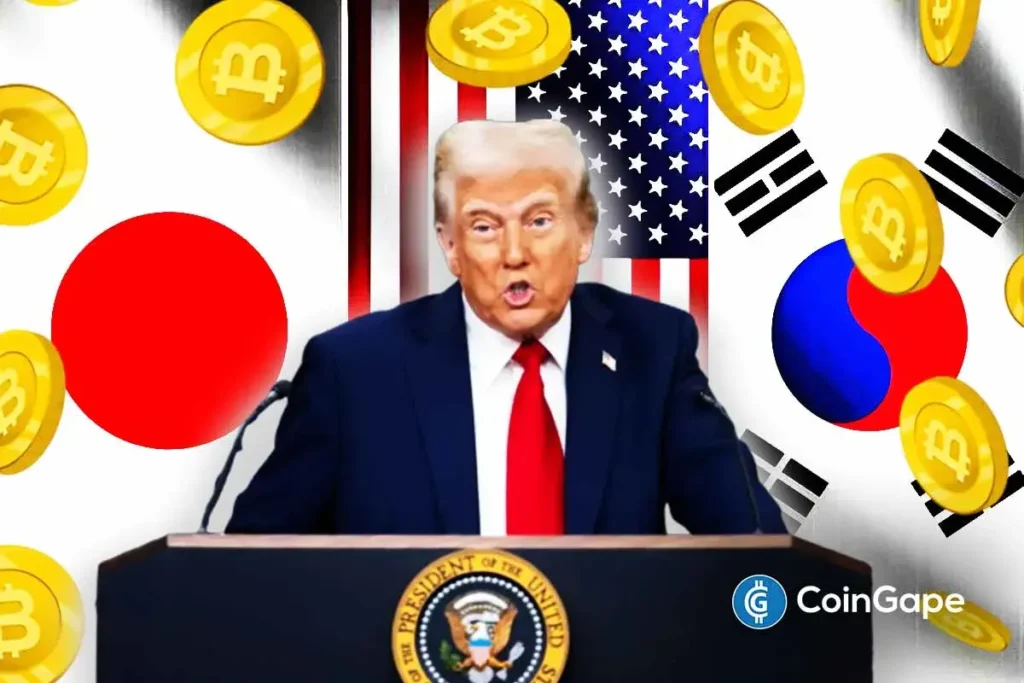Trump Tariffs on Japan and South Korea: Implications for BTC and Global Trade
As the July 9 deadline approaches, former US President Donald Trump is intensifying his focus on trade by announcing a significant 25% tariff on goods imported from Japan and South Korea. This move aims to address perceived trade imbalances between the United States and these nations, marking a revival of discussions reminiscent of his "Liberation Day" speech. With these tariffs set to take effect, concerns are arising not only in global trade circles but also within the cryptocurrency realm, as Bitcoin (BTC) faces downward pressure amidst this volatile economic landscape.
Unfair Trade Practices: Trump’s Rationale for Tariffs
In a series of posts on Truth Social, Trump articulated his views on the unfair trade practices that he believes have disadvantaged the US. He argues that the existing trade agreements have resulted in significant trade deficits, contributing to economic challenges in America. By imposing these tariffs, Trump aims to encourage fairer trading terms and protect domestic industries from foreign competition. However, critics warn that such measures could escalate tensions with these key trading partners, thereby instigating broader economic ramifications.
Impact on Bitcoin: A Crypto Market Reacts
The announcement of these tariffs has had an immediate impact on Bitcoin’s market performance. According to data sourced from CoinMarketCap, BTC is teetering around the psychologically crucial level of $108,000. As anticipation built leading to Trump’s tariff announcement, the cryptocurrency’s value already dipped below this threshold, signifying the bearish sentiment permeating the market. Market analysts speculate that the imposition of tariffs could lead to increased volatility, negatively affecting Bitcoin and other cryptocurrencies.
Historical Context: Previous Trump Tariffs and Market Reaction
The current market conditions echo a previous downturn experienced in April when Trump first hinted at introducing tariffs. During that time, Bitcoin saw a dramatic plunge, dropping as low as $78,000 before recovering later that month to reach a new all-time high (ATH) in May. This pattern raises concerns that the crypto market may again be heading toward tumultuous territory if the trade disputes escalate further. Investors should be mindful of the historical context as it provides critical insights into potential future movements.
Broader Implications for Global Trade
These tariffs are not isolated to just Japan and South Korea; they highlight a broader trend in international trade dynamics. With Trump threatening up to a 70% tariff on several nations, including major economic players like India and those within the European Union, there is heightened apprehension around the future of global trade relationships. Trade wars can lead to retaliation, further complicating international economic stability and potentially leading to supply chain disruptions. The interconnectedness of economies makes such developments a concern not only for traders but also for consumers and businesses worldwide.
Navigating Market Uncertainties
As we navigate these uncertain market conditions, both investors and traders must exercise caution. The looming trade war threatens to exacerbate volatility, not just for cryptocurrencies but for financial markets across the board. In such a fluctuating landscape, thorough research and an understanding of market fundamentals become paramount for making informed investment decisions. Investors are advised to remain vigilant and adapt their strategies in response to changing economic indicators and geopolitical developments.
Conclusion: The Road Ahead
In summary, Trump’s decision to impose tariffs on Japan and South Korea serves as a pivotal moment in the ongoing trade dialogue between key global players. The immediate fallout is already visible in the Bitcoin market, where prices are under pressure. As we anticipate further developments leading up to the July 9 deadline, it’s crucial for stakeholders across various sectors to stay informed. Understanding the complexities of this situation could not only affect investment strategies in cryptocurrencies but could also shape future economic policies and global trade agreements. Moreover, as discussions evolve, businesses and individuals alike must be prepared for the unpredictable nature of a shifting trade landscape.


